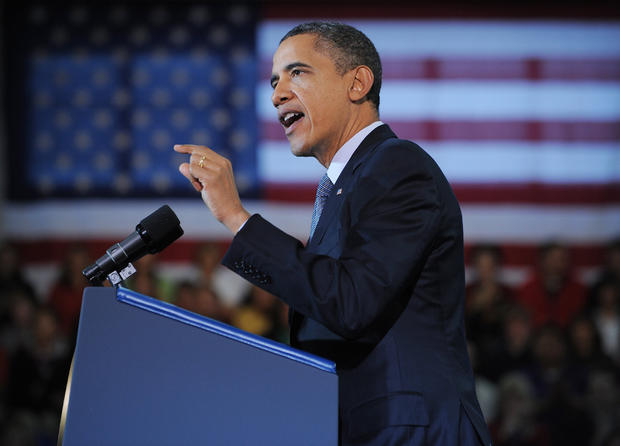Obama's strategy: Staying "above the fray"
HONOLULU - With a second-term at stake, President Obama's strategy for 2012 is aimed at avoiding the kind of cliffhanger showdowns with Congress that marked the year just ending.
He also plans to expand on his effort to be seen as a warrior for the middle class.
"As I've said before, we are at a make-or-break moment for the middle class," Mr. Obama said today in his weekly address on radio and the Internet.
Just hours before the start of the New Year, President Obama is promising to do everything he can "to make America a place where hard work and responsibility are rewarded: one where everyone has a fair shot and everyone does their fair share."
It's a reiteration of the ideological approach he unveiled December 6 in a speech in Osawatomie, Kansas.
"We're going to be doubling-down on our commitment and our message in terms of fighting for the middle class," explains White House Deputy Press Secretary Josh Earnest, who briefed reporters here Thursday on the president's outlook for the New Year.
The White House sees Congress as the most unpopular public institution in America - and President Obama will be looking to further distance himself from dealing with it.
Portraying Congress as "gridlocked" and "dysfunctional," Earnest said Mr. Obama wants to be seen as a leader "leaving no stone unturned" in pursuit of solutions to the financial and economic challenges facing the country.
The White House sees only one "must-do item of business" that President Obama must finish with Congress: Extending the payroll tax cut from two months to all of 2012.
"In terms of essential, must-do items, the payroll tax cut extension is the last one," said spokesman Earnest.
"Is he giving up on Congress?" I asked at the press briefing Thursday.
"Not at all," replied Earnest. "There are certainly a number of other things that we're interested in trying to work with Congress to get done."
He cited elements of the president's American Jobs Act that have yet to be enacted, and there are scores of nominations on which the Senate has declined to advise and consent.
But, Earnest said, President Obama wants "no more cliffhangers" with Congress.
Recalling last summer's showdown at Capitol Hill over raising the debt limit, and this month's stalemate over the payroll tax cut extension, Earnest said, "These cliffhangers were pretty damaging" - to the economy, to political debate, and on public confidence in Washington.
Instead, he said that Mr. Obama plans during the New Year to step up the pace of putting forward what he calls his "We Can't Wait" executive actions that don't require Congressional approval.
Earnest said the President will be demonstrating that he won't wait for Congress: "He's going to seize every opportunity that he has to put in place the kinds of policies that will continue and strengthen our economic recovery."
It's the kind of rhetoric Mr. Obama can use to reach out to voters - disenchanted by lawmakers and political bickering - who may be the deciding factor in the 2012 election.
But the White House does not want President Obama to be seen in unabashed campaign mode just yet.
Earnest said the Republican field of presidential candidates will be seen in "stark contrast to an incumbent President who's rising above the fray in Washington, advocating proven, bipartisan economic proposals."
And as 2012 begins, Earnest said Mr. Obama "will not be focused . . . on his reelection campaign."
"He is in a place where his principal time and attention and focus will be on his job as President and on strengthening our economy and putting in place the kinds of policies that will advance our economic recovery," Earnest told reporters covering the president's 12-day Hawaiian getaway. "There will be time later in the year to focus on the reelect."
Earnest's claims aside, President Obama has engaged for months in events, appearances and activities that lend themselves to his campaign.
In the year just ending, he has taken part in 71 political fundraisers - 67 of them for his re-election campaign. His appearances on behalf of the Obama Victory Fund have taken him to 12 states, including California, New York, Florida, Illinois, Pennsylvania, Missouri, Washington and Nevada. Most of them are states without which he cannot win a second term.
And many of his policy speeches in 2011 were scheduled in states deemed "must-wins" for his re-election.
In fact, this coming Wednesday - the day after the Republican Caucuses in Iowa - President Obama will be in Ohio. The White House bills it as an official event, a policy speech on the economy. But it will be his 17th visit to the battleground state since taking office. One of his most-frequently visited states, Ohio is a state he won in 2008 and which is deemed essential to his bid for a second term. But the White House prefers to say such visits are unrelated to any campaign objectives.

